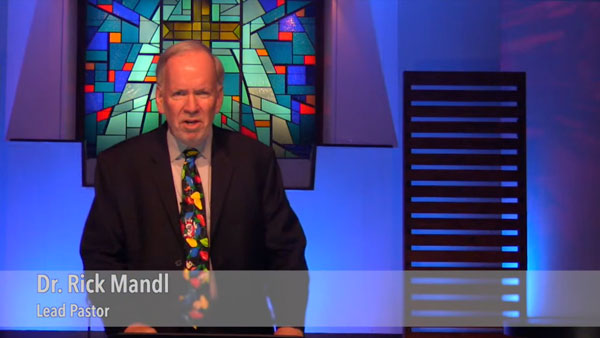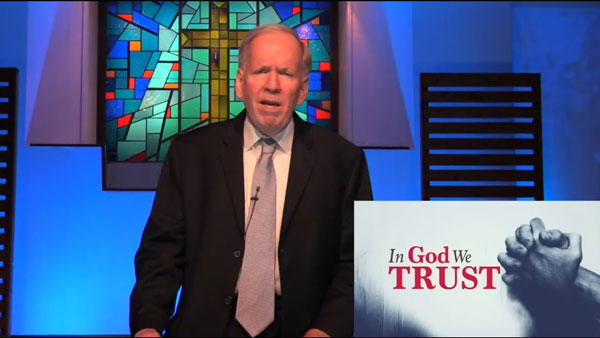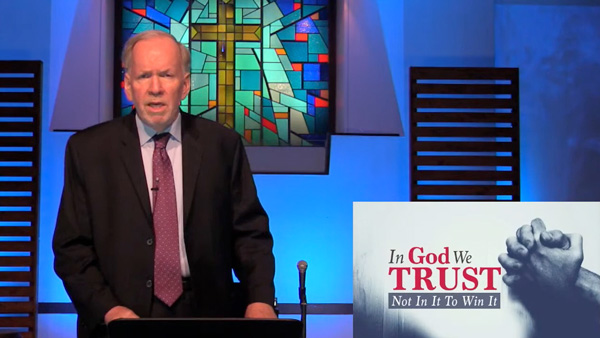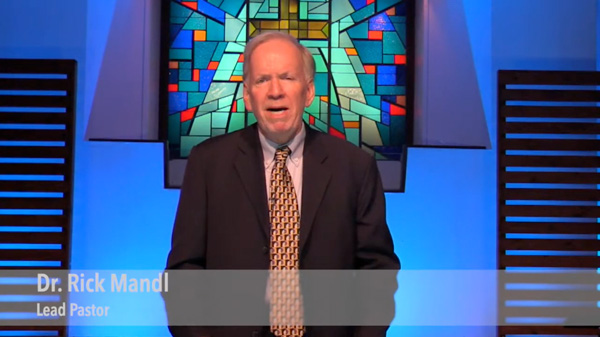Dr. Rick Mandl - January 24, 2021
Why Should I Trust God?
Sermon Manuscript: In God We Trust Message 4- Why Should I Trust God
Sermon preached by Dr. Rick Mandl, Eagle Rock Baptist Church, January 23 & 24, 2021
Recorded in Los Angeles, CA.
Hey church family. Great to welcome you as we come together to worship
This past Wednesday Joseph Biden was sworn in as our forty-sixth president.
In his inaugural address, one of the things that President Biden said was:
“My whole soul is in this: bringing America together, uniting our people, uniting our nation. And I ask every American to join me in this cause.” Earlier, that day President Trump released a video farewell address in which he stated… “We inaugurate a new administration and pray for its success in keeping America safe and prosperous.” All Christians, whatever our political beliefs, we are all called to lift up our nation and its leaders in prayer. God’s Word commands that “supplications, prayers, intercessions, and thanksgivings be made for all people, for kings and all who are in high positions.” Let’s take that challenge to heart and offer a word of prayer right now for our new president and our country. Would you pray with me. . . .
Once again, great to be with you as we come together for worship and as we wrap up a series we’ve been in called “In God We Trust.” Today wrapping up that series by thinking about the question of . . . Why Should I Trust God? Particularly thinking about WHY I should trust Him during those times when He seems to be so far away. When it seems like He is absolutely oblivious to the struggles that I’m going through. We’re going to be covering a lot of scripture in this message, so it will be easier to follow along if you grab hold of your message notes . . . There’s a link to download them, right below this player and that will help you to follow as we go.
And while you’re getting those notes I want to share with you something that I think is a great example of the way that a lot of us may feel at one time or another. What I’m going to show you comes from a TV commercial for a certain brand of windows. And as you watch it, I’d ask you to think about whether you’ve ever felt like the guy on the other side of the pane of glass in this spot. Take a look at this. . . Pella Windows Commercial. I wonder if any of you have ever felt like the guy on the other side of the window in that commercial. Everything's going wrong, you’re world is falling apart, and you feel like God is somewhere on the other said of a triple paned window, and he’s totally oblivious to everything that is happening to you. Hopefully that’s not where you’re at right now, but I think if we’re honest, most of us have been there at one time or another. And that’s what I want us to think about today.
How we keep on trusting God during those times when we can’t see Him? During those times when it feels as though He has left the building? And the part of God’s Word that I want us to look to for an answer today is Psalm 77. This particular psalm as not writer by King David, who was the one who wrote most of the psalms, but rather was writer by a man Asaph.
If you read the psalms that he wrote you’ll find that Asap was a man who struggled with depression. And depression is something that all of us struggle with at one time or another. One writer calls depression "the common cold of emotional disorders." In Psalm 77 Asaph shares some of the . . . Symptoms of his struggle . . . A struggle with the fact that he felt as though God was nowhere to be found . . . I want you to look at the symptoms of his discouragement here in Psalm 77. And as you do, see whether maybe you can relate to any of these?
The first symptom is this. I feel like Praying is Pointless. In verses two and three he says . . . “When I was in distress, I sought the Lord; at night I stretched out untiring hands and my soul refused to be comforted. I remembered you, O God, and I groaned” (Psalm 77:2-3). He says “I sought the Lord.” In other words, “I prayed, but felt at though my prayers weren’t getting any higher than the ceiling. He says, “My prayers brought me no comfort.”
The second symptom of his discouragement at feeling abandoned by God is that he . . . Can’t Sleep. He has insomnia, and he’s blaming it on God. You see that in Verse 4. . . . He says . . . “You kept my eyes from closing. . . He says, “I don’t even have words to express the way I’m feeling.’
A third symptom . . . I long for the Good Old Days. It’s interesting, but when you’re going through one of those times where you feel like God has abandoned you . . . Like he’s nowhere to be found. . . One of the things that you’ll sometimes do is look back, and the days behind you somehow, are always something that you remember as being better than they really were. The Psalmist says . . . “I thought about the former days, the years of long ago; The good old days . . . I remembered my songs in the night” (Psalm 77:5–6a). And that’s what those good old days were . . . . Nothing but good. . . Just song after song, sung in the night. Funny how we always seem to remember the “good old days” as being better than they actually were.
And then the final symptom of this psalmist’s depression . . . I don’t think things will Ever Get Better. Take a look at verses 7 and 8. Asaph says . . .
“Will the Lord reject forever? Will he never show his favor again? Has his unfailing love vanished forever? Has his promise failed for all time? Has God forgotten to be merciful? Has he in anger withheld his compassion?” (Psalm 77:7–9a). Don’t miss the words that he uses there. . . . Words like forever and never and forever and for all time. Someone said this is just true of human nature. When you’re down, you feel like you’ll never be up again. And when you’re up, you feel like you’ll never be down again. And the writer of this psalm was DOWN, DOWN, DOWN.
What does he share in this psalm as The Solution? As the way out of his pit of despair? The Solution that he shares. . . And you see it in verses 10-12 is something that you might call . . . The Power Of Positive Remembering. Not positive thinking, but positive remembering.
Now positive thinking is great, as far as it will take you, right? Given the choice I would much rather be around you if you’re a Polyanna than a Debbie Downer. I appreciate people who see the cup as Half-Full, rather than Half-Empty Me? I just want to know who drank the other half. But the problem with positive thinking is that there are times when it just doesn’t work. Just because you can conceive something, doesn’t mean you can achieve it.
Positive thinking. . . Too often tries to peer into the future and make things happen. The problem with that is, you have no control over the future. But positive remembering is different, because it can look to the past, and focus on fact. And that’s what we need to do. Look at what the Psalmist did in Psalm 77:10-12. He writes . . . Then I thought, “To this I will appeal: the years when the Most High stretched out his right hand. I will remember the deeds of the Lord; yes, I will remember your miracles of long ago. I will consider all your works and meditate on all your mighty deeds” (Psalm 77:10-12). Again – POSITIVE REMEMBERING.
Take a look at those verses and notice his focus on REMBERING. He said . . . I will remember the deeds of the Lord . . . I will remember your miracles of long ago… I will consider all your works and meditate on all your mighty deeds. What’s the SECRET to being able to do what Asaph did, and point to the things that he pointed to? The secret is a principle that you see throughout the Bible that you can call . . . The Principle Of Monumental Faith, And what it’s talking about is faith that is strengthened by monuments. One example of this is when Joshua leads the nation of Israel across the Jordan River.
Do you remember what happened? The waters parted and the people walked across on dry land. Now this is actually THE SECOND TIME a miracle like this happened for the children of Israel. What was the first time? It was the Red Sea? God parted the Red Sea as the Children of Israel came out of Egypt ahead of Pharaoh’s arm. That was 40 years prior to God parting the waters of the Jordan, But. . . the Bible says that the people forgot what God did for them. And so, Psalm 78 tells us that as a result of their forgetfulness, terror and fear struck their hearts when they thought about going into the promised land. . . Why? Because they forgot the wonders of God. So the next time that God parts the waters, 40 years later, Joshua says, TIME OUT.
As they're getting ready to move on, he says let’s take a moment and have everybody go back to the riverbed while it's still dry, and pick up a big river rock. Why? What were they going to do with the rocks? Look what he says in the next verses. . . It says . . . “Each of you is to take up a stone on his shoulder… to serve as a sign among you. In the future, when your children ask you, 'What do these stones mean?' tell them… These stones are to be a memorial to the people of Israel forever” (Joshua 4:5–7). He says, “Let these stones serve as a monument. . . Let them serve as a memorial . . . Let’s not make the mistake that we made before in forgetting what God has done for us. Let’s set something aside as a reminder.
Read through your Bible and you’ll see that . . . . Over 100 Times The Bible Tells Us To “Remember” God’s Deeds. Why? Why are we commanded as Christians to remember? There are a multitude of reasons, but let me give you FOUR: These aren’t on your notes, but you might want to jot them down so you can refer back to them later.
God commands us to remember. . . .
1. Because we’re forgetful. God knows better than we do how forgetful we are of who He is and what He has done, And it’s for that reason that He commands us over and over and over again to remember. The command to remember is a command as forceful as any other command you find in Scripture. And so if there’s one thing we can learn from the repetition of that command it’s that Remembering, is an active choice. Without us actively and intentionally choosing to remember, we will forget.
CS Lewis knew this and once remarked, “People need to be reminded more than instructed.” I don’t know if you’ve ever thought about it this way, but this is one of the reasons that we come together each weekend in worship. When we open the scripture, more often than not, we’re not necessarily doing that to learn. . . We’re doing it to remember. After all, Solomon, who was regarded as one of the wisest men who ever lived, has written that. . . “There is nothing new under the sun” (Ecc. 1:9). But just because it’s not new, doesn’t mean it’s at the front of our minds. Because we’re forgetful, we need be reminded to remember.
A second reason that I believe that scripture repeats this command so often is that . . .
2. Remembering makes us aware. The forgetful person is the person who is unaware. As we go about our daily lives, it’s so easy for us to operate on auto-pilot and entirely forget the fact that an all powerful and all-loving God has put this day together for us. We will, if we don’t fight against it, by default forget the fact that this is His day, the day that He has made. . . And He has made it for our sake and for His glory. When we choose to remember, we are making the decision to actively look for what He is doing that we might otherwise miss at first glance.
A third reason why we’re told again and again to remember is because . ..
3. Remembering gives us hope. As we look back over the course of our lives, we are able to see in retrospect things that we might not have been able to see at any given moment. We can for example, with the benefit of rear-view vision see that no matter what the circumstances were, the Lord was actually at work in a given situation for our good, and for His glory. When we find ourselves feeling like we’re stuck in the weeds in the middle of a situation from which we see no way out - - remembering gives us hope - because we are reminded that God has never once abandoned us. And the fourth reason we’re commanded to remember is because. . .
4. Remembering gives us perspective. Whatever is happening to us right now - - typically tends to be the thing that we’re focused on. The present trial, the present joy, or the present sorrow - - those are the things that dominate our focus. But remembering provides us with perspective. That’s the WHY behind the command to remember.
But that leaves us with the question of . . . HOW. The issue of “HOW” you do this. . . How you develop MONUMENTAL FAITH?? Let me give you three things you can do to help develop monumental faith . . .
#1 Notice God Working. At the end of Psalm 77 there's a verse that Asaph wrote that says . . . Your path led through the sea, your way through the mighty waters, though your footprints were not seen” (Psalm 77:19). Think about that. . . God's footprints are never really seen. But if your eyes are open to it, you will see that he was there.
David demonstrates this same kind of monumental faith when is about to go into battle against the giant Goliath. He could have looked back on his life and said, “You know what, if it weren’t for bad luck, I wouldn’t have had any luck at all. One time when I was out watching the sheep. . . “I was attacked by a lion.” Another time when I was watching the sheep . . .“I was attacked by a bear.” And now here I am just doing the “Postmates” thing and dropping off lunch for my brothers, and suddenly I’ve got to face off against this giant
But that wasn’t his perspective.
Instead he said . . . “The Lord who rescued me from the paw of the lion and the paw of the bear will rescue me from the hand of this Philistine” (1 Samuel 17:37). David had developed the ability to NOTICE God Working, around him, and in him and through him. To the point where he didn’t see the things that he had been through as just random occurrences, but rather examples of God at work. It happened for him, and it can happen for you and me, but you’ve got to be looking for it, so that you won’t miss it when it happens.
One of the NEXT STEPS on the back of your notes, and on your connection card for this week is to ask God to help me to NOTICE Him working - - - you need to be intentional and look for it, or you’ll miss it. A second thing you can do to Create Your Own Monuments. Now you don’t have to necessarily make your monuments out of River Rock, like the children of Israel did when God led them across the Jordan, although sometimes a physical reminder of what he’s brought you through can be helpful . . . But one simple way of creating your own monuments is to keep a journal. This can be a pen and paper journal or a file on your computer where you keep a record of your prayers requests, and your answers to prayer. You keep a record of ways in which you saw God at work in your life or the lives of those around you. Then during the dark times, the times of doubt, the times when maybe you’re wondering if there even is anyone on the other side of that window who knows what you’re going through, you can look back and be encouraged realizing that if God did it once, He can do it again.
A third thing you can do to develop monumental faith is to . . . Share Your Stories. When it comes to sharing your faith. . . And I’m talking specifically here about sharing Christ, with someone who doesn’t know Him, one of the most powerful tools that God has given you is your own faith story. And the reason that it’s so powerful is because it’s YOUR story – no one else’s. It’s your experience of how God led you into a relationship with Himself. But in a similar way, your stories of how you have seen God at work in your life, in the years since you entered into a relationship with Him are no less powerful.
And you need to share them, and share them often, for at least two reasons. First of all to encourage others, And secondly, so they’re not forgotten.
Again, on your notes. . . . Our memory verse for this week comes from Psalm 78:4 and it says . . . “We will tell the next generation the praiseworthy deeds of the Lord, his power, and the wonders he has done” (Psalm 78:4). Would you join me in asking God to help us to be faithful to do that. . . Let’s pray . . .
Recorded in Los Angeles, CA.
Scripture References: Psalms 77:2-3, Psalms 77:4, Psalms 77:5-6, Psalms 77:7-9, Psalms 77:10-12, Joshua 4:5-7, Psalms 77:19, Psalms 78:4
From Series: "In God We Trust"
We all put our faith in something: family, a job, ourselves, or even the church. But quite often we end up disappointed when that something lets us down. The Bible says the only place to put our trust is in God. What if we're not sure that God can be trusted? How do we learn to do that?




